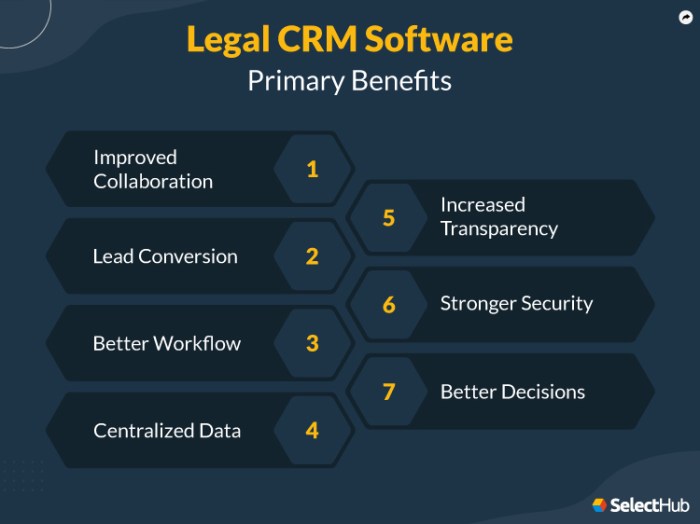legal CRM software sets the stage for this enthralling narrative, offering a comprehensive look into how it revolutionizes law firm operations. This specialized software goes beyond traditional CRM systems by catering specifically to the unique needs of legal professionals, enhancing client interactions and streamlining case management. As the legal landscape continues to evolve, understanding the functionalities and benefits of legal CRM software becomes increasingly critical for law firms aiming to stay competitive.
From managing client relationships to integrating billing systems, legal CRM software serves as an indispensable tool that facilitates better organization and communication. Law firms can leverage features that are tailored to their practice, ensuring they meet client expectations while boosting internal efficiency. With various solutions available in the market, firms are empowered to make informed decisions about which software best suits their specific requirements.
Overview of Legal CRM Software
Legal CRM software is specifically designed to meet the unique needs of law firms and legal practitioners. These systems facilitate the management of client relationships, streamline case handling, and enhance communication within the firm and with clients. Popular legal CRM solutions include Clio, PracticePanther, and MyCase, each offering tailored features to improve workflow in legal environments. What sets legal CRM software apart from general CRM systems is its focus on legal-specific functionalities such as case management, compliance tracking, and document management, providing a comprehensive solution for legal professionals.
Benefits of Implementing Legal CRM Software

Implementing legal CRM software offers numerous advantages for law firms, enhancing operational efficiency and client management. For instance, studies have shown that firms using CRM systems experience a significant reduction in time spent on administrative tasks, allowing for more focus on client service. In fact, a case study revealed that one law firm increased its billable hours by 30% after adopting a dedicated CRM solution. Legal CRM improves client relationships and communication by providing real-time updates, personalized engagement, and streamlined processes that lead to higher client satisfaction levels.
Key Features of Legal CRM Software

Essential features that every legal CRM should possess include:
- Case Management: Centralizes case details, deadlines, and documents.
- Client Data Management: Organizes client information, ensuring easy access and security.
- Communication Tools: Facilitates contact management and correspondence tracking.
- Reporting and Analytics: Offers insights into firm performance and client engagement.
- Integration Capabilities: Allows seamless connection with other legal tools and software.
The importance of client data management in legal CRM cannot be overstated. Effective data handling enables firms to create tailored experiences, ensuring that each client feels valued and understood.
Integration with Other Legal Tools
Legal CRM software can seamlessly integrate with practice management tools, creating a unified ecosystem that enhances operational efficiency. For instance, by linking a CRM system with practice management software, firms can synchronize case details and client communications without manual data entry. Additionally, integrating legal CRM with billing and accounting software simplifies invoicing and financial tracking, reducing errors and saving time. This unified approach allows firms to streamline workflows, ultimately leading to improved service delivery.
Choosing the Right Legal CRM Software
Selecting the best legal CRM software for a firm’s needs involves careful consideration of several criteria, including:
- Scalability: The software should grow with the firm.
- User-Friendliness: An intuitive interface is crucial for staff adoption.
- Cost-Effectiveness: Evaluate the total cost of ownership, including hidden fees.
- Support and Training: Availability of resources for ongoing assistance.
- Customization Options: The ability to tailor features to fit specific legal practices.
A checklist for evaluating different CRM options should include assessing functionality, user reviews, and vendor reputation. Common pitfalls to avoid include overlooking the importance of user training and failing to involve staff in the selection process.
Implementation Strategies for Legal CRM Software
Successfully implementing legal CRM software requires a strategic approach. The steps involved typically include:
- Needs Assessment: Identify specific firm requirements and objectives.
- System Setup: Configure the CRM according to the firm’s structure and workflows.
- Data Migration: Ensure smooth transfer of existing client and case data.
- Staff Training: Provide comprehensive training sessions to familiarize employees with the new system.
- Feedback and Optimization: Collect user feedback for continuous improvement.
For effective training, consider hands-on workshops and ongoing support to empower staff in using the new system. Measuring the success of CRM implementation can be done through tracking user engagement, client satisfaction, and operational metrics.
Future Trends in Legal CRM Software

Emerging technologies such as artificial intelligence and machine learning are poised to influence the future development of legal CRM solutions. These advancements could lead to more intelligent systems capable of predictive analytics, enhancing decision-making processes in law firms. Predictions indicate that as legal CRM software evolves, firms will increasingly leverage data-driven insights to offer personalized services and improve client relations. However, potential challenges may include adapting to rapid technological changes and ensuring data privacy in an increasingly digital landscape.
Outcome Summary
In summary, the implementation of legal CRM software is not just a trend but a necessary evolution in the legal sector. By harnessing its capabilities, law firms can significantly improve operational efficiency and client satisfaction. As we look to the future, staying abreast of emerging trends in legal CRM software will be vital for firms aiming to thrive in an increasingly competitive environment. Investing in this technology today will pave the way for greater success tomorrow.
